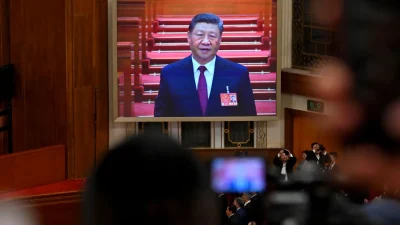Why China thinks it might win a trade war with Trump

The trade war is escalating, and fast. On April 8th Chinese officials vowed to “fight to the end” in the face of new threats from Donald Trump, made just hours earlier, having already promised to match American tariffs of 34%. With such an increase, China’s tariff rate on American imports will reach 70%. Later the same day, the White House confirmed that it would return fire, with tariffs of 104% applying to Chinese goods from April 9th.
There is little to prevent decoupling between the world’s two largest economies. Although Mr Trump’s intentions in unleashing the biggest disruption to trade in modern history are not fully clear, he seems less interested in striking a deal with China than ever before. All negotiations would be terminated if China imposes its levy of 34%, he said on his social-media site, when announcing the latest measures. Chinese officials call this a “mistake on top of a mistake”, and have not ruled out talks. Their tough response nevertheless probably forecloses that possibility.
Until the recent escalation, Mr Trump’s tariffs on China had been met with a swift but blunted response. Chinese officials had been eager to show they would not be pushed around; at the same time, they were content to pick their punches, so as to limit self-harm and avoid further escalation. This, the thinking went, would allow for easier negotiations when the time came—a calculation that now appears to have been discarded.
Tesla, an electric-vehicle firm owned by Elon Musk, Mr Trump’s adviser, is vulnerable to retaliation, since it does about a fifth of its business in China. “This is huge leverage on the us government unless Elon is asked to go,” says Alicia Garcia Herrero of Natixis, a French bank.
Chinese officials may also believe that America will be unable to bear the inflation and economic discontent caused by Mr Trump’s tariffs. Instead of “fighting to the end”, they may only need to fight until American consumer prices begin to rise or employment begins to fall. Senior advisers, government researchers and economists all point to this as the easiest way of bringing Mr Trump to the table. Some talk of finding ways to exacerbate the situation, perhaps by strengthening the yuan. This would be quite a gamble. By the time inflation had picked up in America, Chinese industry and supply chains would be suffering.
The People’s Daily, a state newspaper, said on April 6th that cuts to interest rates and banking-reserve ratios could come at any time. The paper has also said that local governments will help struggling exporters to find new sources of demand at home and in non-American markets. Soochow Securities, a Chinese broker, has suggested that China could lower tariffs on the rest of the world, while increasing export subsidies.
As markets around the world have reeled, China has been quick to step up support. On April 7th and 8th state firms entered China’s market to buy stocks. Owing to this assistance, the csi 300 index of the Shanghai stockmarket rose by 1.7% on April 8th. Economists worry that stimulus for the real economy will arrive much more slowly, with any interventions piecemeal and reactive in nature, and materialising only after a sharp slowdown. According to Larry Hu of Macquarie, a bank, things will get worse before they get better.
Mr Xi will also need to consider if he is willing to see China’s economy fully decouple from America’s. Although China has been pursuing technological self-reliance, it has largely rejected the notion of “decoupling”, seeing it as a way for the West to punish China. Now, however, there is growing support for it.
A short list of planned responses, posted online by various well-connected commentators on April 8th, suggests that China is considering the suspension of all co-operation with America on fentanyl. Another idea is to ban imports of American poultry and other agricultural products, such as soyabeans and sorghum, which mainly come from Republican states.
These ip holdings may constitute monopolies and earn excess profits, according to one influential blogger, who goes on to say that China’s success with an animated film, called “Ne Zha 2”, and the poor performance of “Snow White” in America, could help justify reducing imports of American films or banning them all together.

